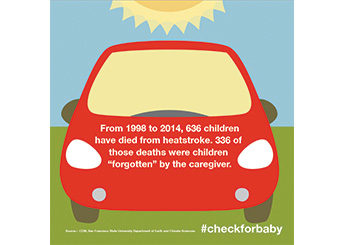Kids in hot cars: NHTSA releases toolkit for preventing heat-related deaths

Photo: National Highway Traffic Safety Administration
Washington – As outdoor temperatures increase, the National Highway Traffic Safety Administration is reminding parents and caregivers about the dangers of leaving children in hot cars.
The administration recently published a toolkit (available in English and Spanish) for preventing vehicle-related heat stroke. The kit includes safety tips, a fact sheet and an online form for caregivers to pledge that they will remain vigilant.
Heat stroke is the No. 1 cause of non-crash-related motor vehicle deaths among children 14 and younger, according to NHTSA. From 1998 to 2014, 636 children died from heat stroke after being left in a vehicle. Fifty-three percent of those children had been forgotten by a caregiver, 29 percent were playing in unattended vehicles and 17 percent were intentionally left in the vehicle.
Tips for parents and caregivers include:
- Never leave a child alone in a parked vehicle.
- Always check the front and back seats of the vehicle before walking away.
- To prevent children from playing in unattended vehicles, always lock your vehicle doors and trunk, and keep keys out of the reach of children.
- Make sure your child’s daycare facility calls you if your child does not show up.
- If you see another child alone in a hot vehicle, take action by locating the parents, asking for the vehicle’s owner to be paged over a facility’s public address system or calling 911.
Children are particularly vulnerable to heat stroke because their body temperature rises 3 to 5 times faster than an adult’s temperature, NHTSA states. A child in a parked vehicle is at risk even if the windows are rolled down – a vehicle can heat up by as many as 20º F in only 10 minutes.
Post a comment to this article
Safety+Health welcomes comments that promote respectful dialogue. Please stay on topic. Comments that contain personal attacks, profanity or abusive language – or those aggressively promoting products or services – will be removed. We reserve the right to determine which comments violate our comment policy. (Anonymous comments are welcome; merely skip the “name” field in the comment box. An email address is required but will not be included with your comment.)

